Woman Faces Criticism For Asking Boyfriend To Rehome Aggressive Dog, His Last Connection To Deceased Mother
In a world where the blending of lives often comes with unforeseen challenges, a woman's dilemma highlights the complexities of merging households, especially when pets are involved. At 28, she finds herself at a crossroads, having to make decisions that not only affect her future with her fiancé, Dan, but also the well-being of her beloved cat.
This cat, adopted during a period of personal struggle, has become her emotional anchor, transforming her inherited house into a true home. As Dan prepares to move in, bringing along a reactive dog inherited from his late mother, tensions rise, revealing underlying issues of pet compatibility, emotional attachment, and the responsibility of caring for animals with difficult pasts.
OP meticulously details her journey, from inheriting her grandparents' home to adopting a cat that significantly improved her mental health during the lockdown. Her cat, an indoor pet with a traumatic background, requires a safe, stable environment—something the OP has painstakingly provided.
On the other hand, Dan's dog, untrained and aggressive, poses a clear threat to this carefully cultivated sanctuary. The OP's suggestion to rehome the dog with a more capable relative sparks backlash from his family and friends, painting her as insensitive to Dan's emotional connection to the last living link to his mother.
OP and her fiancé Dan have been together for 2 years; they are considering him moving into OP's house as his lease is ending soon and the renewal rate is high.

OP inherited the house from her grandparents and has done a lot of redecorating since then and during the lockdown, but her mental health started to degrade during lockdown, leading her to decide to adopt a cat.

The Emotional Attachment to Pets
Dr. Samantha Green, a psychologist specializing in human-animal relationships at Emory University, emphasizes the deep emotional connections people often form with their pets.
Pets can represent not only companionship but also a link to loved ones, as seen in this situation where the dog symbolizes the deceased mother.
Such emotional attachments can complicate decisions regarding pet care, especially when pet behavior poses a challenge.
The rescued cat brought significant positive changes to OP's life, prompting her to create a cozy and roomy home for it.

Dan never mentioned the cat, but they got along well; however, it has now become a problem.

Research indicates that pet ownership can provide significant psychological benefits, including decreased feelings of loneliness and increased emotional support.
However, when a pet becomes aggressive or problematic, it can create stress and conflict within relationships, particularly if the pet is linked to unresolved grief.
In this scenario, the boyfriend's attachment to the dog may be exacerbated by feelings of loss and nostalgia.
Dan's mom died, leaving her old, untrained dog in his care, which has caused ongoing behavioral issues.

The dog displays aggression towards everyone, including its owner, Dan, yet he plans to move into OP's place with it.

Navigating the Grief of Loss
Grief can manifest in various forms, and for many, pets serve as emotional anchors during difficult times.
Dr. Lisa Harper, a grief counselor, notes that losing a pet or facing the possibility of rehoming one can trigger complex emotional responses.
Understanding these responses is crucial for addressing the underlying grief and guilt that may arise in such situations.
OP has informed Dan that his dog can't stay with them due to safety concerns for her small, medically delicate cat.

OP suggested he consider giving the dog to his aunt, who has experience with "problematic dogs" and can help correct its behavior.

One effective strategy for dealing with aggressive pets is to seek professional training and behavior modification.
Research shows that behavioral interventions can significantly improve pet behavior and reduce stress for both the pet and the owner.
Additionally, open communication between partners about the pet's role in the household can help mitigate conflict.
His family and friends are pressuring both of them, accusing OP of being heartless for suggesting he rehome the dog, which holds sentimental value as the last connection to his late mother.

If Dan had properly trained the dog, it could have worked, but his negligence makes it unsafe.
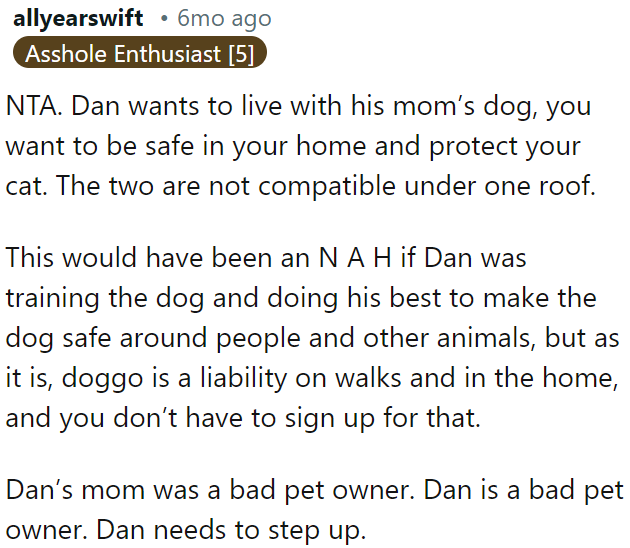
Addressing Relationship Dynamics
The dynamics between partners can become strained when one partner's emotional attachments interfere with shared decisions.
Studies indicate that couples therapy can help partners navigate these complexities, fostering understanding and collaboration in decision-making.
Such therapeutic interventions can enhance communication and reduce feelings of resentment.
OP isn't suggesting getting rid of the dog; she is merely proposing a change of scenery that might make him happier.

Bringing an untrained dog into a new environment with people and a cat is a recipe for disaster.
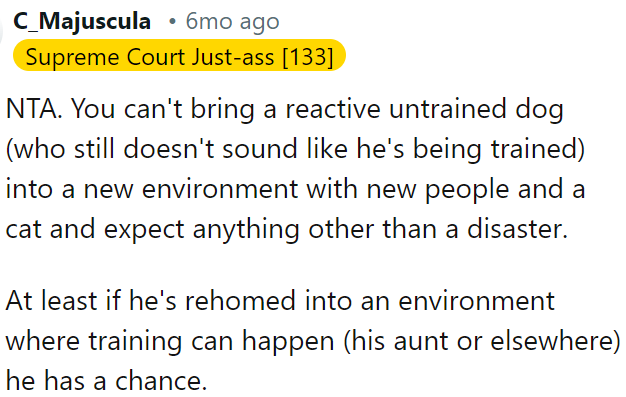
Dan needs to get help with his dog's behavior, either from a professional trainer or someone who knows what they're doing. Until they can figure out how to ensure all the pets get along safely, it's understandable that the woman is hesitant about having Dan and his dog move in permanently.
She needs to stand up for her cat's safety and not feel pressured to give up her pet just to make the relationship work. Everyone's pets deserve to feel safe and happy in their home, and that should be the top priority.
It's irresponsible to allow a dangerous animal to jeopardize her pet's safety, which would make her a bad pet owner.
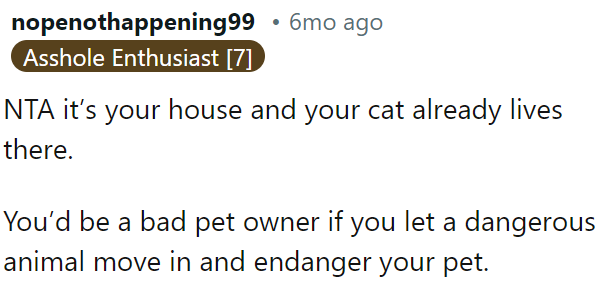
Encouraging Dan to seek professional help for the dog's behavior could be beneficial.
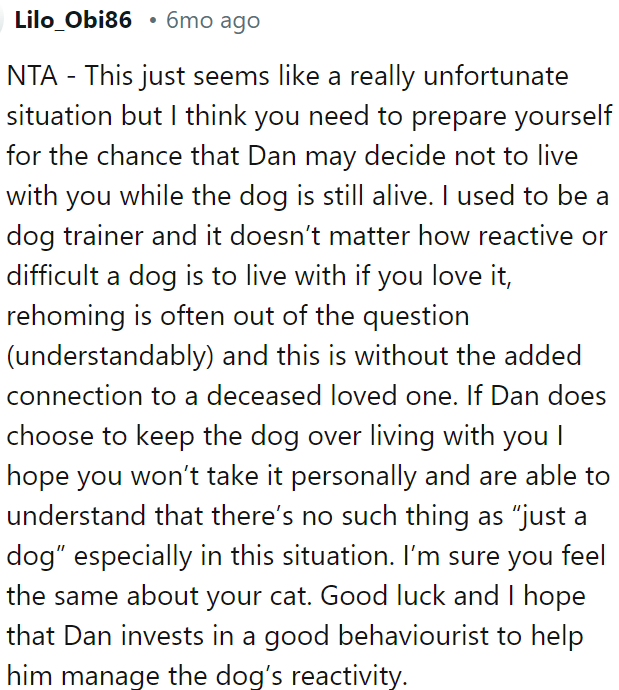
He should hire a professional trainer if he can't handle it himself, especially if he plans to move in with the dog.

Living together with Dan and his dog isn't feasible until there's a peaceful coexistence plan with OP's cat.
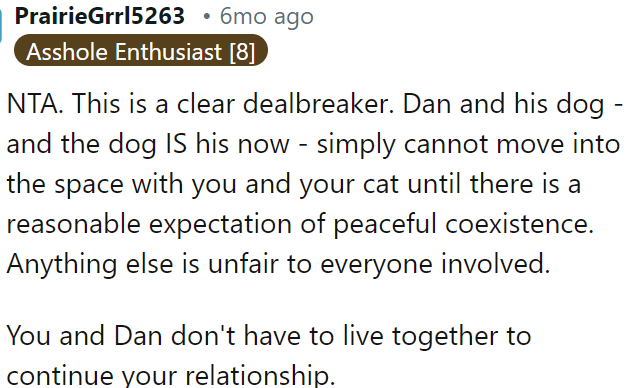
It's OP's home, so her rules apply.

It's been 1.5 years; OP should have discussed this sooner.
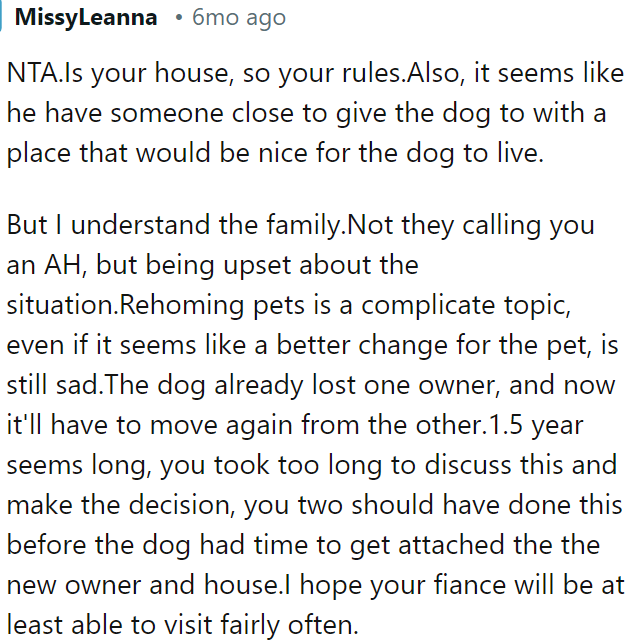
OP's suggestion keeps the dog within the family and might even provide a better environment for it.
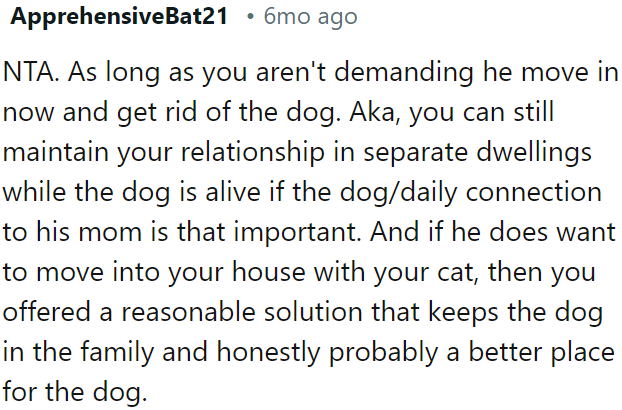
Using emotional blackmail is not okay.
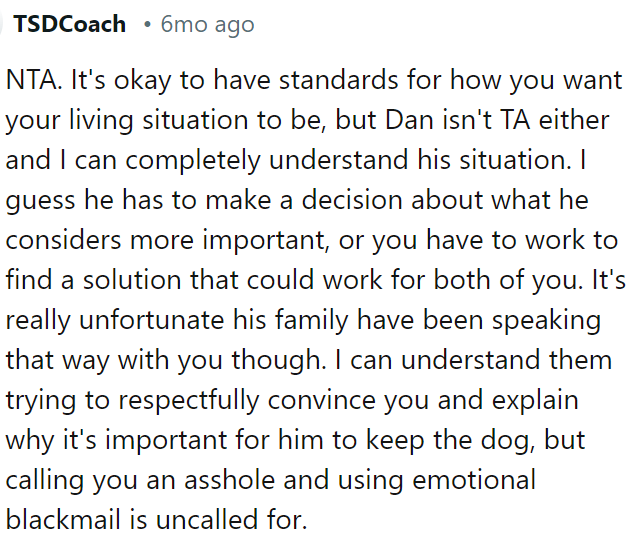
OP might consider giving away her cat if she's prioritizing the relationship, just as she's asking him to.
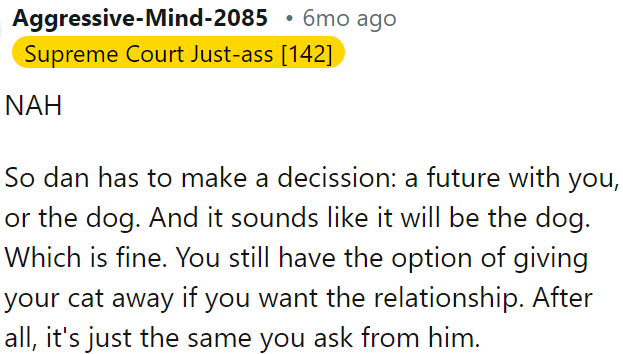
Psychological Analysis
This situation underscores the complexities of navigating emotional attachments in relationships.
When one partner has a strong attachment to a pet, it can complicate shared decisions, particularly when behavioral issues arise.
Analysis generated by AI
Analysis & Alternative Approaches
The emotional bonds between humans and pets can complicate relationship dynamics, especially in the face of behavioral challenges.
Understanding the psychological aspects of grief, attachment, and communication is essential for navigating these issues.
Through open dialogue and professional support, couples can work towards solutions that honor both their relationship and the attachments they hold dear.



